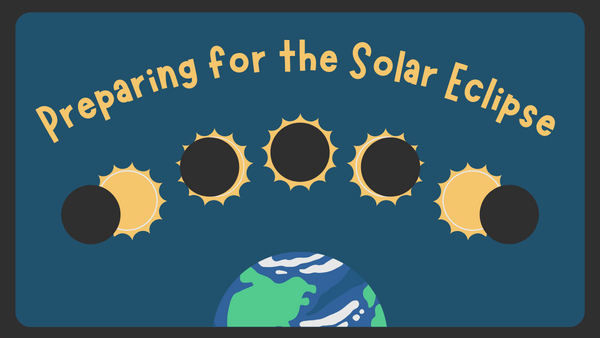Tips for the April 8th Solar Eclipse

On April 8, 2024, a total solar eclipse will cross North America, passing over Mexico, the United States, and Canada. A total solar eclipse happens when the Moon passes between the Sun and Earth, completely blocking the face of the Sun. The sky will darken as if it were dawn or dusk.
You might remember the eclipse of 2017. This eclipse is expected to last longer than the one 7 years ago, and Michigan is closer to the path of totality.
In Vicksburg, Michigan, the eclipse will start at 1:54pm, the peak is expected at 3:10pm, and the eclipse will end at 4:24pm. We are in an area of more than 90% coverage.
Safety during the eclipse is extremely important. It is never a good idea to look directly into the sun. When viewing a solar eclipse, it is important to take safety precautions to avoid long-term injury to the eyes.
Here are some tips on safe viewing of the eclipse from NASA and the Kalamazoo County Health and Community Services Department:
DO:
- Use eclipse glasses or solar viewers that meet the International Organization for Standardization, or ISO standards. The glasses should be clearly labeled ISO 12312-2. *Vicksburg Community Schools has purchased certified solar glasses for all students and staff.* Even with the proper glasses, do not stare continuously at the sun. Take breaks and give your eyes a rest.
- Use a box pinhole viewer. Learn how to make one
- Use a pinhole projector. Learn how to make one
DON'T
- Do not look at the sun directly.
- Do not view through regular sunglasses. No matter how dark they are, they will not protect your eyes.
- Do not wear the solar glasses while driving or stop your car on the road to view the eclipse.
- Do not use damaged eclipse sunglasses or solar viewers. If they are torn, scratched or punctured, do not use them and throw them away.
- Do not use homemade filters.
- Do not view through welder's glass. The glass in most welding helmets is not strong enough.
- Do not view through your camera viewfinder.
- Do not view through a telescope without the proper solar filter. Do not view the telescope using your eclipse sunglasses either.
- Do not view through binoculars.
Remember, looking directly into a solar eclipse for any amount of time can be damaging to the human eye, so top priority is to prepare for eye safety!
Utilize the following resources to prepare everyone for a safe and exciting learning experience:








